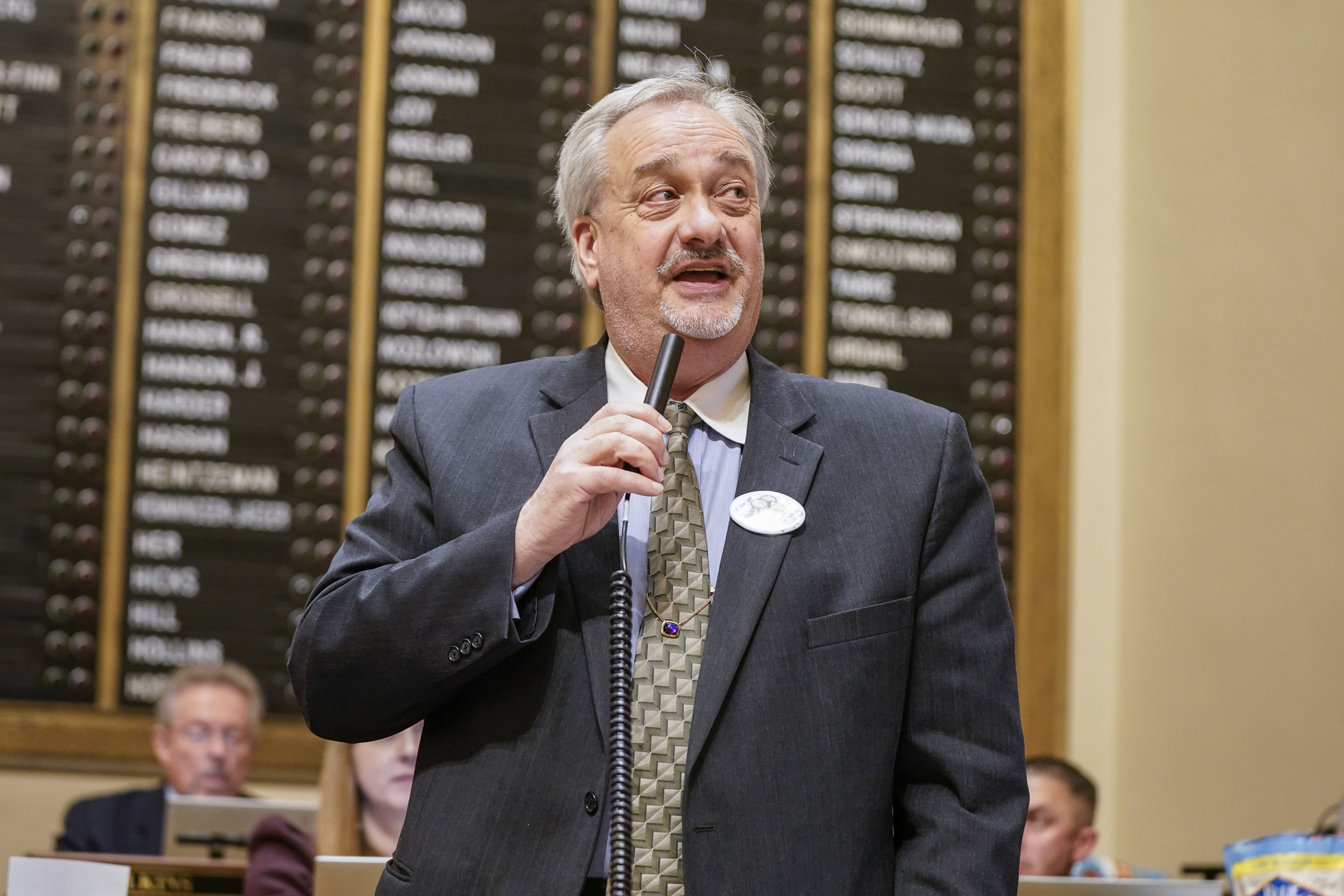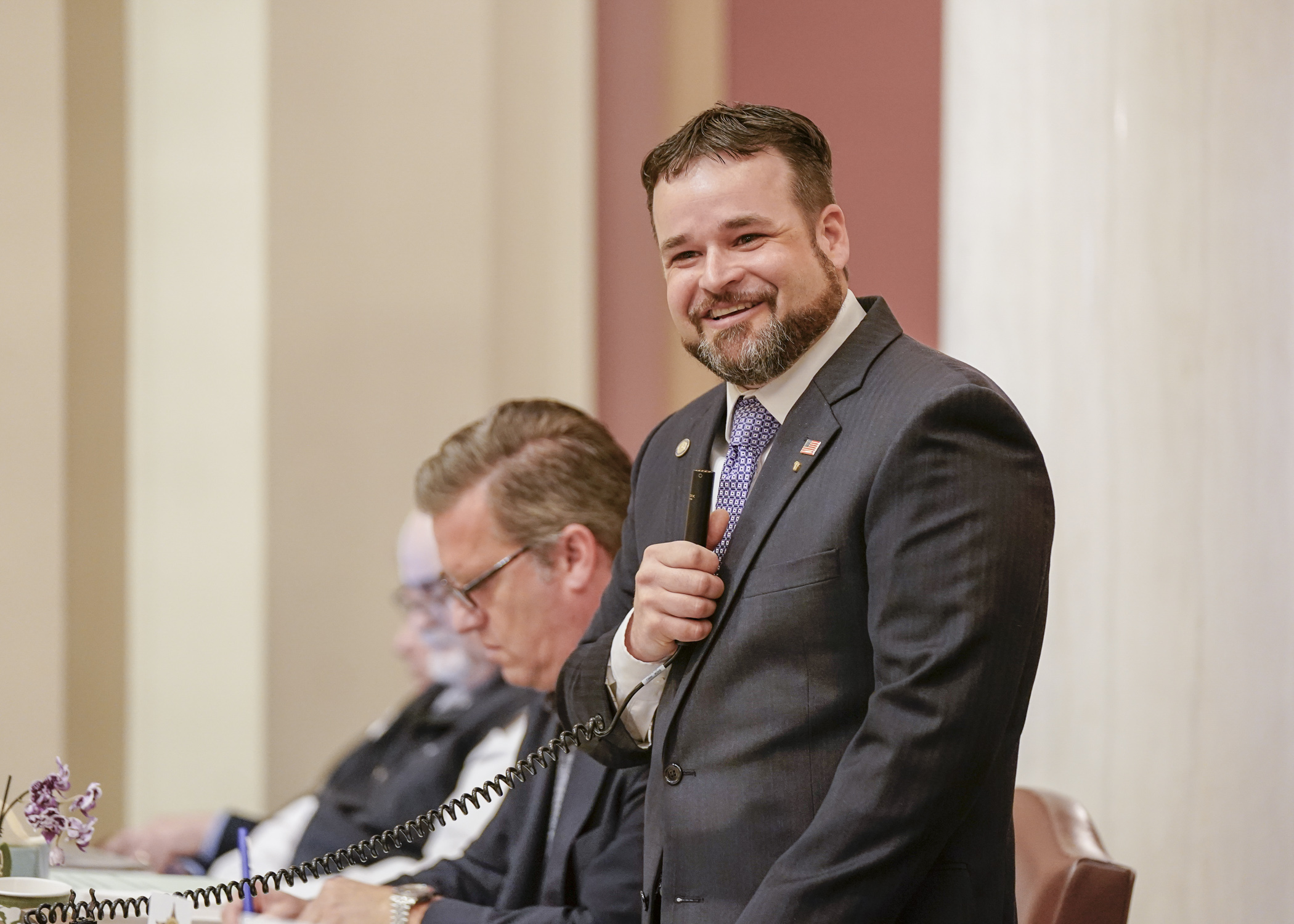House repasses environment, energy bill that supporters call ‘most significant in Minnesota history’

For the past few sessions, DFL-sponsored environment and climate and energy bills have consistently carried many of the same provisions. This year, with an estimated $17.5 billion budget surplus and Democratic majorities in the House and Senate, those priorities are expected to finally reach Gov. Tim Walz’s desk.
Many of those provisions from bills of the past five sessions are in the conference committee report on HF2310, assisted by a hefty spending increase to support the work.
Sponsored by Rep. Rick Hansen (DFL-South St. Paul) and Sen. Foung Hawj (DFL-St. Paul), the report was adopted and the bill repassed 72-57 by the House Thursday. It is now on its way to the Senate.
Rep. Sydney Jordan (DFL-Mpls) said lawmakers should be extremely proud to vote for a bill that prioritizes and protects the environment like no bill has ever done before, but they also could be ashamed that it took so long to act.
“We’ve been hearing this for years, for decades, but we are taking action today because we all deserve clean water and we all have a right to breathe the air,” Jordan said.
The bill would authorize more than $1.6 billion in environment and natural resources spending for the next biennium, including $939 million for the Department of Natural Resources, $535 million to the Pollution Control Agency and $120.1 million for the Board of Water and Soil Resources. There is $667 million in new General Fund spending. It would also fund projects with proceeds from the Environment and Natural Resources Trust Fund.
For items related to energy and climate change, the bill contains $282.3 million in net appropriations from the General Fund and $110.8 million from the Renewable Development Account in the next biennium.
That state-administered account is designed to support renewable energy projects and is made up of money that Xcel Energy pays to the state for being able to store nuclear waste at its Prairie Island and Monticello nuclear power plants. The bill contains revisions to the agreement between the state, Xcel Energy and the Prairie Island Indian Community.
[MORE: View the spreadsheets for environment and natural resources, Environment and Natural Resources Trust Fund, and climate and energy]
Environment and natural resources
“This is the most significant environment and climate bill in Minnesota history, both in terms of its investment and its reforms,” Hansen said.
Legislators have been working for years on issues addressed in the bill, he said, citing regulating perfluoroalkyl and polyfluoroalkyl substances, dealing with damage caused by the emerald ash borer, contending with chronic wasting disease, managing the spread of aquatic invasive species, repaying the Metropolitan Landfill Contingency Action Trust, and responding to the cumulative impact of pollution in overburdened communities.
According to Hansen, the differences between the conference committee report and the bill that passed the House in April are Senate budget provisions for boating access, soil health and climate resiliency.
“As a compromise, we worked with the Senate to come forward on amounts that we think will serve Minnesota well,” Hansen said.
Increased fishing and state park fees are not included in the final report. But there would be increases to triannual watercraft registration fees, including a $119 increase for boats longer than 40 feet (from $90 to $209).
The bill would also prohibit intentionally adding PFAS chemicals starting with household items such as cosmetics and dental floss. Those regulations were named in honor of Amara Strande, who recently died at age 20 but spent her last weeks advocating for a ban on the “forever chemicals” that have been associated with a broad range of health problems.
 Rep. Josh Heintzeman argues Thursday against adopting the conference committee report on HF2310, the environment and natural resources, climate and energy finance bill. (Photo by Catherine Davis)
Rep. Josh Heintzeman argues Thursday against adopting the conference committee report on HF2310, the environment and natural resources, climate and energy finance bill. (Photo by Catherine Davis)Rep. Isaac Schultz (R-Elmdale Township) took issue with provisions that would require cumulative environmental impacts be considered in some permitting cases, saying the analysis will double the permitting timeline for any project from hospitals to factories.
Rep. Josh Heintzeman (R-Nisswa) praised additional money for DNR infrastructure, but characterized some provisions as squandering, rather than spending. He gave as examples funding for the Lawns to Legumes pollinator habitat program and money for a biomass energy facility in St. Paul.
[MORE: View details about environmental provisions]
Climate and energy
Among the bill’s largest appropriations in the area of climate and energy would be for pre-weatherization and workforce training, the Solar for Schools program, and a new Minnesota Climate Finance Authority to fund smaller renewable energy projects. The bill also includes an electric vehicle rebate program, as well as new grants for electric school buses, heat pumps and residential electric panels.
Rep. Larry Kraft (DFL-St. Louis Park) quoted from the most recent report of the United Nations’ Intergovernmental Panel on Climate Change and its urgent calls for reduced greenhouse gas emissions, but also spoke of the success that St. Cloud has found with developing renewable energy sources and saving the city money.
“While climate is something that can certainly be dire, I believe that it is a tremendous opportunity,” he said. “It’s an opportunity to restore our relationship with the natural world, to clean our air and water, to create good local jobs. … And, perhaps most importantly, to leave a functioning world for our kids, grandkids and future generations.”
[MORE: Details about the bill’s climate and energy provisions]
“This bill is bad,” said Rep. Spencer Igo (R-Wabana Township). “There’s nothing we can be proud of in this.”
Igo and Rep. Jeff Backer (R-Browns Valley) advocated for more of northern Minnesota being opened up to mining minerals that could be used in renewable energy. Igo also expressed disgust that the bill doesn’t require students to be taught about the use of slavery in mining.
--Session Daily writer Rob Hubbard contributed to this story.
Related Articles
Search Session Daily
Advanced Search OptionsPriority Dailies
Ways and Means Committee OKs proposed $512 million supplemental budget on party-line vote
By Mike Cook Meeting more needs or fiscal irresponsibility is one way to sum up the differences among the two parties on a supplemental spending package a year after a $72 billion state budg...
Meeting more needs or fiscal irresponsibility is one way to sum up the differences among the two parties on a supplemental spending package a year after a $72 billion state budg...
Minnesota’s projected budget surplus balloons to $3.7 billion, but fiscal pressure still looms
By Rob Hubbard Just as Minnesota has experienced a warmer winter than usual, so has the state’s budget outlook warmed over the past few months.
On Thursday, Minnesota Management and Budget...
Just as Minnesota has experienced a warmer winter than usual, so has the state’s budget outlook warmed over the past few months.
On Thursday, Minnesota Management and Budget...